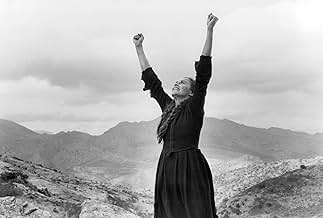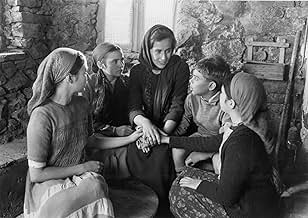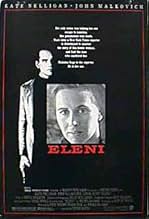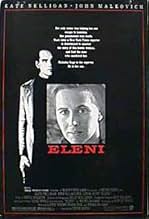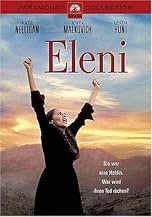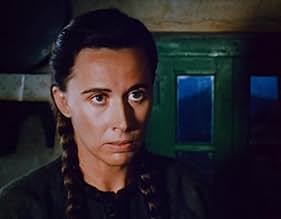Eleni
- 1985
- Tous publics
- 1h 54min
NOTE IMDb
6,9/10
1,8 k
MA NOTE
Ajouter une intrigue dans votre langueA mother's love for her children leads to a son's revenge for her death in this dramatic thriller that begins during the Greek civil war.A mother's love for her children leads to a son's revenge for her death in this dramatic thriller that begins during the Greek civil war.A mother's love for her children leads to a son's revenge for her death in this dramatic thriller that begins during the Greek civil war.
- Réalisation
- Scénario
- Casting principal
Avis à la une
A story about the love of family and how strong political opinions can make people monsters, helped by personal gains.
Found the back and forth in time a little confusing.
The scenery and settings were beautiful and convincing, the actual scenes were heart wrenching and I felt the agony of the characters.
I was so sad that it wasn't possible to watch this in Greece (but was able to watch abroad), because of the fanaticism of the supporters of a certain political group.
The 1945 to 1949 civil war in Greece still raises heavy debates, partly because the Communists lost and the losers seem to attract some sympathy from ordinary people.
Found the back and forth in time a little confusing.
The scenery and settings were beautiful and convincing, the actual scenes were heart wrenching and I felt the agony of the characters.
I was so sad that it wasn't possible to watch this in Greece (but was able to watch abroad), because of the fanaticism of the supporters of a certain political group.
The 1945 to 1949 civil war in Greece still raises heavy debates, partly because the Communists lost and the losers seem to attract some sympathy from ordinary people.
Great movie, with a good performance from Kate Nelligan. Cant believe all the people defending communist kidnappers and murderers, after all the years of Nazi murders, people actually defend thugs kidnapping children, murdering villagers who refused to agree with them, etc, etc, etc.... The Greek Civil War was nothing more than Stalin trying to add Greece to his list of appetizers along with Poland, Hungary, Romania, Bulgaria, etc... Stealing children to take behind the iron curtain, executing parents who try to keep their own children, stealing houses, livestock and food crops to feed the murderers of their own people is not a good thing and this movie sends that message in spades. People are supposed to be happy about being out from under the fascist murderers and put under the domination of communist ones???????
This film seems to have unjustly attracted a lot of nonsensical comments, mostly from left of center commentators; and it's sadly revealing how the facts cited by other viewers are not even addressed, but simply ignored by the left-ist commentators. Those who accuse the film of being anti-communist propaganda mostly use ad hominem arguments, and insult and invective. But ask yourself: what good is a political view which assumes itself (because it is self-described as "revolutionary") to be above ordinary moral or political criticism? If that were true, then there could never be any way to judge the value of the actions performed in its name.
In short, this is a reasonably good film, with a fine performance by Kate Nelligan, and much less good work by other members of the cast. The direction is not inspired, and the flashback structure of the film seeks to maximize the emotional effects without stopping to consider just how powerful those effects are all by themselves, that is, the use of that structure betrays the fear of the film-makers that the story might not have the impact they wanted it to have.
The original book is stronger, but it too is flawed by Nicholas Gage's failure to ask himself about how it was that the communists picked on his mother, even though he presents some of the evidence that answers the question. It's clear from the book that some members of his family -- I think his grandfather, but it's been a long time since I read the book -- had serious disputes with other people in the village in the 20s and 30s and perhaps even earlier, and that there may even have been a murder involved; naturally, Gage is not all that clear on the point. The communists, men, most of them, couldn't go after the grandfather, so, brave souls that they were, went after the most vulnerable: the Gage womenfolk. Despicable, but that is often the tenor of village and peasant life.
And to me, this was the message of the book, that the politics of revolution were, in many cases, simply another weapon in the never-ending village war between its own members. The problem with the film is that it never really clarifies this central aspect of the drama, and so the power of Nelligan's performance is marooned. It affects, but it's almost in a vacuum, and Malkovich's portrayal of Gage, which I thought quite good, is similarly detached; but the flaw lay in the original book, which ducks important questions because Gage, North American that he is, simply doesn't understand the deeper currents of village life.
Worth a look, no matter its flaws. No work of art is ever perfect, and this one gets high marks for trying.
In short, this is a reasonably good film, with a fine performance by Kate Nelligan, and much less good work by other members of the cast. The direction is not inspired, and the flashback structure of the film seeks to maximize the emotional effects without stopping to consider just how powerful those effects are all by themselves, that is, the use of that structure betrays the fear of the film-makers that the story might not have the impact they wanted it to have.
The original book is stronger, but it too is flawed by Nicholas Gage's failure to ask himself about how it was that the communists picked on his mother, even though he presents some of the evidence that answers the question. It's clear from the book that some members of his family -- I think his grandfather, but it's been a long time since I read the book -- had serious disputes with other people in the village in the 20s and 30s and perhaps even earlier, and that there may even have been a murder involved; naturally, Gage is not all that clear on the point. The communists, men, most of them, couldn't go after the grandfather, so, brave souls that they were, went after the most vulnerable: the Gage womenfolk. Despicable, but that is often the tenor of village and peasant life.
And to me, this was the message of the book, that the politics of revolution were, in many cases, simply another weapon in the never-ending village war between its own members. The problem with the film is that it never really clarifies this central aspect of the drama, and so the power of Nelligan's performance is marooned. It affects, but it's almost in a vacuum, and Malkovich's portrayal of Gage, which I thought quite good, is similarly detached; but the flaw lay in the original book, which ducks important questions because Gage, North American that he is, simply doesn't understand the deeper currents of village life.
Worth a look, no matter its flaws. No work of art is ever perfect, and this one gets high marks for trying.
I weep because my family is portrayed in this film. It reminds me of the pain they went through but refused to speak about. A story that received no fanfare but brought pain to many. I see through the eyes of the director and the words of Nick Gage what they went through. A beautiful, love letter to a strong mother.
Other people commenting on this film complain about its being mere propaganda against communism and supporting fascism. What a lot of baloney. It's about mothers and children, and about how, no matter what kind of brawl is going on, the men run to the hills, leaving the women and children behind to be brutalized. And it's about how one woman lost her life because she refused to give her children up to the state, no matter who that state was.
Le saviez-vous
- AnecdotesAdditional flashback scenes were filmed featuring Alfred Molina as Nick's father Christos (played by Steve Plytas in the 1980s scenes). Although Molina was credited as "Young Christos" in press materials, and his scenes were shown in publicity photos, his role was almost completely cut from the final version, and his name does not appear in the credits. Molina's only remaining footage in the released film is a single shot of Christos taking a photograph of Eleni, Nikola and family, with his face partially obscured by his camera.
Meilleurs choix
Connectez-vous pour évaluer et suivre la liste de favoris afin de recevoir des recommandations personnalisées
- How long is Eleni?Alimenté par Alexa
Détails
Box-office
- Budget
- 12 000 000 $US (estimé)
- Montant brut aux États-Unis et au Canada
- 305 102 $US
- Week-end de sortie aux États-Unis et au Canada
- 27 875 $US
- 3 nov. 1985
- Montant brut mondial
- 305 102 $US
- Durée
- 1h 54min(114 min)
- Couleur
- Mixage
- Rapport de forme
- 1.85 : 1
Contribuer à cette page
Suggérer une modification ou ajouter du contenu manquant

